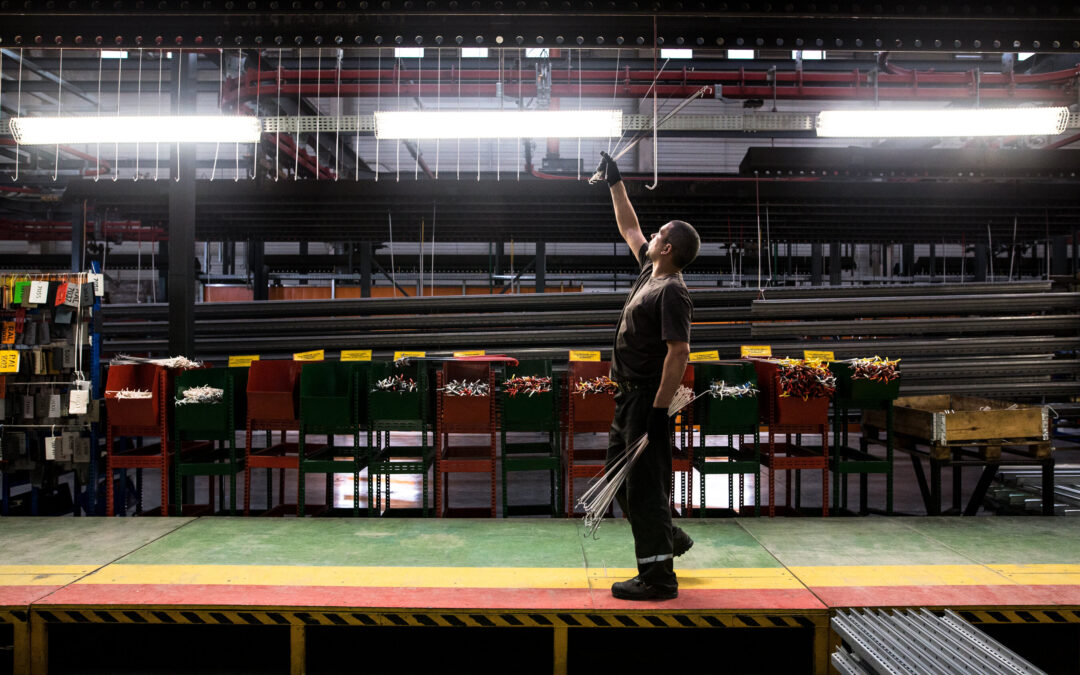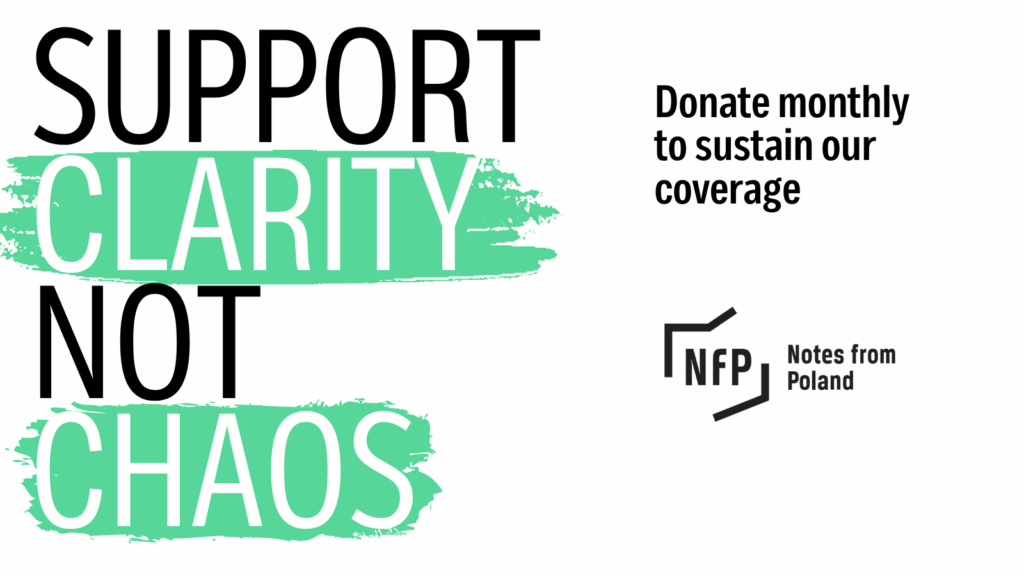Keep our news free from ads and paywalls by making a donation to support our work!

Notes from Poland is run by a small editorial team and is published by an independent, non-profit foundation that is funded through donations from our readers. We cannot do what we do without your support.
By Małgorzata Tomczak
Poland’s unprecedented level of immigration in recent years – which is among the highest anywhere in Europe – is most often associated with the country’s eastern neighbours, Ukraine and Belarus, who do indeed account for the majority of new arrivals.
However, many are also coming from elsewhere, in particular Latin Americans, who last year received almost 45,000 work permits in Poland, over five times more than two years earlier. The vast majority are Colombians, with significant numbers also from Argentina and Venezuela.
Malgorzata Tomczak, a journalist and PhD researcher specialised in migration, looks at what has driven this trend, and what problems and opportunities it has created, both for the immigrants themselves and the Polish state.
A rapidly growing diaspora
Immigration data concerning the Latin American diaspora are scattered and incomplete. Most arrive via visa-free movement from elsewhere in Europe – often starting their journey in another Schengen country – and so are not listed in Polish visa statistics or registered with the Polish border guard.
Poland’s Social Security Institution (ZUS) indicates that by the end of 2024, over 15,000 Colombians were registered as workers, making them Poland’s fifth-largest non-EU workforce after Ukrainians, Belarusians, Georgians and Indians. The sharp increase started a few years ago – in 2021, only 513 Colombians were registered in ZUS, and since then, the number has tripled each year.
The number of foreigners in Poland’s social insurance system rose 6% in 2023 to reach 1.13 million. Immigrants now make up almost 7% of all those in the system
The largest increases were recorded by Belarusians, Ukrainians, Indians, Colombians and Nepalis https://t.co/eA1QVo0ydH
— Notes from Poland 🇵🇱 (@notesfrompoland) January 27, 2024
Temporary residence permit applications have also surged, with 19,200 Colombians applying in 2024 (compared to 5,512 in 2023 and 825 in 2022). This trend is continuing, with 14,529 applications made by Colombians in the first half of this year.
The influx is reflected in work permit data, too. In 2024, 43,906 work permits were issued to Latin Americans (87% for Colombians, 3.5% for Argentines, 2.2% for Peruvians and 1.8% for Venezuelans), up from 16,383 in 2023 and 7,935 in 2022.
Young, well-educated, seeking security
According to ZUS data, migrants from Colombia are predominantly male (73%) and young, with almost 60% of newcomers aged 20-35.
The Migration 2.0 report prepared by EWL Group, a recruitment firm, and the University of Warsaw’s Centre for East European Studies (SEW) estimates that 43% of Latin American migrants in Poland have higher education.
That is much higher than, for example, among Asian migrants (26% of whom have higher education), resulting in a mismatch between qualifications and jobs: 44% of Latin Americans report working below their qualifications (compared with only 19% of Asians).
In 2024, 73% of work permits issued to Colombians were for jobs in the industrial production industry, which often means food processing. Another 11% were for office and administration work, 10% for transport and logistics, and roughly 3% for construction.
Poland issued 275,000 work permits to migrants from Asia and Latin America last year, five times more than in 2019.
The figures have accelerated particularly fast since 2022, when most Ukrainian men were banned from moving abroad due to the war https://t.co/KldHUG0Ws8
— Notes from Poland 🇵🇱 (@notesfrompoland) May 20, 2024
According to Migration 2.0, Latin Americans choose Poland primarily for its perceived migrant-friendly policies (36%), the ease of finding employment (25%), the presence of friends or acquaintances (21%), and awareness of other Latin American nationals working there (17%).
Notes from Poland spoke with three Latin American migrants living in Poland – Marco from Peru and Felipe and Alejandra from Colombia.
They all confirm the aforementioned motivations for immigrating to Poland, but strongly emphasise the situation in their home countries – political instability, financial struggles and lack of security due to crime – as a “push” factor.
Marco works remotely for an international (re)insurance broker and is married to Pole, with whom he moved to Poland in 2021 so that she could be closer to her family.
Although his own background and motivations differ, he says that for his Latin American acquaintances, security and stability in Poland are crucial, along with better chances of landing a job due to demand for workers. That differs to Spain, a common destination for Latin Americans, where unemployment has been high for years.
Both Felipe and Alejandra highlight the role of word-of-mouth recommendations. Felipe arrived in Paris from Medellín seven months ago without a clear plan for work, stayed for two weeks, and then followed a friend’s recommendation to go to Poland.
The number of immigrants from other EU countries resident in Poland has almost tripled in a decade.
Many have come from Spain, Italy and Portugal, saying that Poland offers better employment opportunities and quality of life https://t.co/4va4HpXZ0t
— Notes from Poland 🇵🇱 (@notesfrompoland) July 1, 2020
Alejandra, struggling financially in Colombia, heard about opportunities in Poland, contacted an employment agency recommended by friends, and in early 2023 travelled to Warsaw to take up a job upon arrival.
All three acknowledge some curiosity and surprise from Poles encountering them in public, but overall report positive reactions.
“Poles, with whom I mainly work, welcomed me very warmly”, says Felipe, who currently works in vehicle manufacturing. “They supported me in training for my job…despite the language barrier.”
But he emphasises that a sense of security is “the most valuable thing Poland gave me”, adding that “I was never afraid that someone would attack me on the street or that I would be robbed”.
Although Felipe came to Poland spontaneously, thinking of it more as a temporary move, he says he has settled in well. “I will do everything I can to stay here legally,” he explains.
Legalisation hurdles
Thanks to visa-free movement, most Latin Americans enter Poland with a biometric passport for a 90-day Schengen stay and seek work and residence permits afterwards.
Although the Polish foreign ministry last summer announced that all Colombians entering Poland for work must now obtain a visa, no change to the law was implemented and the flow of immigration from Colombia has continued as before.
Poland last year issued its lowest number of first residence permits to immigrants from outside the EU since 2014, as @donaldtusk's government sought to clamp down on migration.
Its total of 490,000 permits was, however, still the third highest in the EU https://t.co/reDmBlcGsT
— Notes from Poland 🇵🇱 (@notesfrompoland) September 16, 2025
Legalising one’s stay is often a struggle, owing to long waiting times, misunderstandings about when applications should be updated, and malicious employers.
“In some Polish provinces, applications are reviewed within two to three months; in others, over a year,” says Maria Ossowska, an immigration lawyer who works with Latin American clients and is currently handling around 700 cases, the majority of which are Colombians.
She says her clients often misjudge the 90-day visa-free period, equating it to three months. That leads to last-minute or late applications, which have to be submitted via mail or a document submission office, rather than directly at the provincial office.
However, it can take several months for the provincial office to contact applicants to arrange an appointment to finalise the application, by which time they may have moved address. If the applicant does not inform the authorities of their address change, they miss the correspondence, drop out of the procedure – and their stay becomes illegal.
Ossowska says this happens to 60-70% of her Colombian clients, who “are exceptionally mobile” and “can change jobs and places of residence several times a year”.
In addition, legalisation of stay is often conducted on behalf of migrants by their employers, some of whom do this to genuinely help the employee.
However, dishonest work agencies and business owners do so in order to obtain power of attorney and obstruct their employee’s case, which can lead to them working illegally. That makes it easier for the employer to exploit them, given that if they go to the authorities for assistance they risk being detained and deported.
Alejandra has experienced such problems. “Employers repeatedly deceived me, saying that my work permit was being processed, when in fact they had not even applied for one – I was working illegally without knowing it.”
She moved several times to different cities in search of a better job, initially without realising that she also had to transfer her temporary residence permit application. One agency claimed it had done so, telling her for several months that proceedings were ongoing.
“Then the person who was handling it stopped answering the phone, and later it turned out that they had not dealt with my case at all.”
Illegal employment practices
ZUS data show that most Latin Americans (83.7%) are employed on precarious mandate contracts (umowa zlecenie in Polish) or agency contracts, with only 15.9% on standard employment contracts (umowa o pracę). For comparison, only 36.2% of all migrant workers have mandate contracts.
This may only be the tip of the iceberg when it comes to precarious conditions and employment rights, as other Latin Americans are employed illegally without any contract.
Felipe considers himself fortunate in this respect. He feels well-treated in his workplace and the employment agency he used was transparent about their process, with no fees for job placement.
By contrast, Alejandra was once charged a 50% commission by the agency on her first monthly salary – which she discovered only with her first pay slip – while the company she worked for imposed financial penalties for absences, even those due to illness.
Poland’s government has confirmed it will not introduce reforms to so-called junk contracts, despite that being a step agreed with the EU to unlock funds.
Critics say employers use such contracts to reduce costs and put workers in a precarious position https://t.co/P8GdtHybKk
— Notes from Poland 🇵🇱 (@notesfrompoland) November 22, 2024
Ossowska confirms the existence of such practices, noting that some agencies charge workers between 1,000 and 1,500 zloty (€235-350) for job placement, which is illegal under Polish law, and that “absence penalties” are common.
She explains that disreputable businesses employ workers through various “creative” forms, such as registering them as students or monks in religious orders, in order to reduce mandatory employer contributions or circumvent labour law regulations.
Sindicato de Trabajadores Latinoamericanos en Polonia, an organisation representing Latin Americans working in Poland which receives multiple requests for assistance every day, also confirms large-scale exploitation, particularly in the meat production industry.
“We know of at least three agencies that are linked to each other and that employ illegal workers on a massive scale and commit exceptional abuses,” Sindicato told Notes from Poland. That includes illegally charging job placement commission and selling forged student certificates.
“Yet they continue to cooperate with large Polish companies,” Sindicato adds.
A system in need of reform
While Alejandra, Felipe and Marco perceive Poland as a safe haven and place of opportunities, they all say the Polish government should do more to combat abusive labour practices.
They suggest that could be addressed by improving inspections of employers hiring foreigners and enforcing higher penalties for agencies and firms that violate employment rights or implement illegal practices.
Alejandra, who was scammed by her fellow Colombians when searching for work, fears that “with mass migration to Poland, there are also ‘Colombians with bad intentions’ arriving”, who may be connected to local mafias, involved in human trafficking, or simply common criminals.
Poland has charged a Colombian with terrorism offences over arson attacks on behalf of Russia.
The Internal Security Agency says the incidents were part of a large-scale operation that "recruited people of Latin American origin with military experience"https://t.co/MhfSko1fl8
— Notes from Poland 🇵🇱 (@notesfrompoland) July 29, 2025
Her fears are reflected in police data recently published by the Rzeczpospolita daily, which show rising crime among Colombians, albeit on a very low scale. Twenty-two Colombian nationals were arrested in 2023, with that figure rising to 127 in 2024. In the first half of this year, it was already 118.
Most of those arrests were for drink-driving, but 12 were related to assault (including two who used knives) and six were for gang rape. Earlier this year, in an extremely high-profile case, a 19-year-old Venezuelan was arrested on suspicion of the brutal rape and stabbing of a young woman, who later died from her injuries.
The interviewees also express concern that not all Polish provinces require migrants to submit criminal record certificates from their home countries as part of legalisation procedures.
More broadly, Ossowska believes it is necessary to streamline legislative procedures for work and residence permits as well as visas. She says that lengthy and unclear procedures in consulates as well as long application times in Poland have led to bad practices and misunderstandings.
Sindicato also stresses that Polish consulates must improve their practices so that visas are approved more quickly. However, the organisation is clear that the best way for Latin American workers to get a good start in Poland and avoid being exploited is by coming to the country on a work visa.
“A fully legal arrival and stay greatly improves the chances of finding fair employers and avoiding the problems that many of our compatriots face.”
Police in Poland have shut down a meth lab and arrested two Mexican men linked to the Sinaloa cartel, who are believed to have been "cooks" overseeing production at the site https://t.co/zPMjreFXoB
— Notes from Poland 🇵🇱 (@notesfrompoland) September 8, 2025

Notes from Poland is run by a small editorial team and published by an independent, non-profit foundation that is funded through donations from our readers. We cannot do what we do without your support.
Main image credit: Jakub Orzechowski / Agencja Wyborcza.pl





















